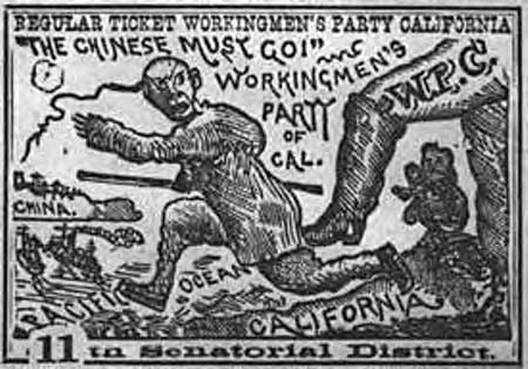Commentary by bostonese.com
San Fransisco, July 10, 2014, — The legislature of British Columbia, Canada passed motion to apologize to the Chinese community in May 2014 for historical wrongs.
The apology, which was introduced by Premier Christy Clark, aimed to recognize and make amends for 160 historical racist and discriminatory policies imposed in B.C., such as denying Chinese immigrants the right to vote and charging them a head tax to immigrate.

An anti-Chinese poster by the Workingmen’s Party of California (file photo).
The following is the full text of the motion.
“Be it resolved that this Legislature apologizes for more than a hundred laws, regulations, and policies that were imposed by past provincial governments that discriminated against people of Chinese descent since 1871, when British Columbia joined Confederation, to 1947.
“These laws and policies denied British Columbia’s Chinese communities’ basic human rights, including but not limited to, the right to vote, hold public office, or own property; imposed labour, educational and employment restrictions; subjected them to health and housing segregation, and prevented them from fully participating in society.
“The House deeply regrets that these Canadians were discriminated against simply because they were of Chinese descent. All members of this House acknowledge that we all aspire to be a fair and just society where people of all nations and cultures are welcomed, accepted and respected.
“Be it further resolved that the House acknowledge that the Chinese Canadian Community endured untold hardships and persevered with grace and dignity.
“We acknowledge that despite being subjected to discriminatory laws, policies and practices, the Chinese community has made, and continues to make, substantial contributions to the culture, history and economic prosperity in our province.”
The state of California should really follow the lead of B.C. and pass motions to apologize the key role it played in the passing of the Chinese Exclusion Act of 1882, which became a blueprint for discriminatory laws in other countries. Some of these historical facts were documented in the 2011 Canadian film The Lost Years.
From their arrival during the Gold Rush, the Chinese experienced discrimination and often overt racism, and finally exclusion. Action often in the form of legislation was used against Chinese immigrants and started as early as the 1850 Foreign Miners’ License Tax law.
In 1854 the California State Supreme Court categorized Chinese with Blacks and Indians, denying them the right to testify against white men in courts of law.
During the 1870s, an economic downturn resulted in serious unemployment problems, and led to more heightened outcries against Asian immigrants. Racist labor union leaders directed their actions and the anger of unemployed workers at the Chinese, blaming them for depressed wages and lack of jobs, and accusing them of being morally corrupt.
As a consequence of this hostility, local and statewide restrictions continued to be enforced against the Chinese. Eventually, the United States government passed the Chinese Exclusion Act of 1882, a law that stood in place until its repeal in 1943.
For a period of 61 years, the pain and suffering created by the Chinese Exclusion were inflicted on tens of thousands of Chinese immigrants.